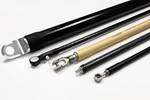PulFlex introduces pultruded Flex Connect
Fiberglass T-slot, primarily used for automation, framing and other quick setup systems, competes with aluminum alternatives.
Source | PulFlex Technologies
PulFlex Technologies (Ford City, Pa., U.S.) is announcing a direct-to-market 1.5" × 1.5" glass fiber composite T-slot framing solution, Flex Connect. Established in 2016, the composites manufacturer focuses on specialty resin systems and fibers, primarily using pultrusion to achieve high-strength, lightweight and fire-resistant parts at higher volumes than other traditional composite processes.
Flex Connect uses a proprietary resin blend and process, which enables parts with properties comparable to metals and even significantly better in some categories, according to the company. When compared to aluminum, for example, Flex Connect solutions offer low electrical conductivity, a reduction in thermal transfer and require less energy to produce.
The T-slot solution is primarily used for automation, framing and other quick setup systems. Most of the current T-Slot materials are used in factories today to enable quick and easy construction of tables, enclosures and other structural systems.
Generally, PulFlex’s specialty is polyurethane resins, as well as polyester, vinyl ester, phenolic and resin development. The main reinforcement it works with is fiberglass, but PulFlex also uses carbon and hemp fiber.
Related Content
-
Carbon fiber, bionic design achieve peak performance in race-ready production vehicle
Porsche worked with Action Composites to design and manufacture an innovative carbon fiber safety cage option to lightweight one of its series race vehicles, built in a one-shot compression molding process.
-
Reinforcing hollow, 3D printed parts with continuous fiber composites
Spanish startup Reinforce3D’s continuous fiber injection process (CFIP) involves injection of fibers and liquid resin into hollow parts made from any material. Potential applications include sporting goods, aerospace and automotive components, and more.
-
Industrializing additive manufacturing in the defense/aerospace sector
GA-ASI demonstrates a path forward for the use of additive technologies for composite tooling, flight-qualified parts.



